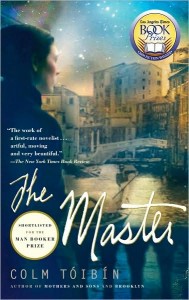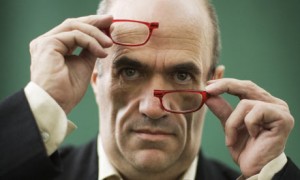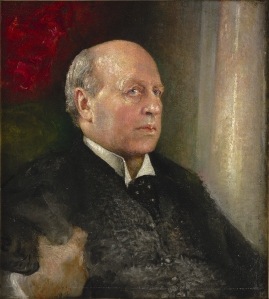When his brother William asks novelist Henry James what is the “moral” of his stories, James replies, “The moral? The moral is the most pragmatic we can imagine, that life is a mystery and that only sentences are beautiful, and that we must be ready for change, especially when we go to Paris, and that no one who has known the sweetness of Paris can properly return to the sweetness of the United States.”
Focusing on the life of Henry James, Colm Toibin’s The Master goes way beyond the usual “novelization” of someone’s biography. Toibin has done a tremendous amount of research and has obviously read everything James has written, but he has so completely distilled all of this information, that in writing this book, he actually recreates Henry James. Most remarkably, he does this while using the third person point of view to tell the story, preserving the objective tone but bringing forth characters and events so vibrant with life that Toibin’s Henry James is the same man that we know from his letters and journals—and from the insights we glean from James’s novels.
the life of Henry James, Colm Toibin’s The Master goes way beyond the usual “novelization” of someone’s biography. Toibin has done a tremendous amount of research and has obviously read everything James has written, but he has so completely distilled all of this information, that in writing this book, he actually recreates Henry James. Most remarkably, he does this while using the third person point of view to tell the story, preserving the objective tone but bringing forth characters and events so vibrant with life that Toibin’s Henry James is the same man that we know from his letters and journals—and from the insights we glean from James’s novels.
The novel opens in 1895, when James’s play, Guy Domville, is booed on opening night. James, now fifty-two, has had high hopes for this play and for a career as a playwright, believing success on stage will put an end to “his long solitary days” and allow him to spend more time among actors, whom he finds fascinating. Described as “a great stranger, with nothing to match his own longings, a man away from his own country, observing the world as a mere watcher from the window,” James, an American by birth, is a lonely and solitary figure throughout the novel, a man unable to form a committed relationship with anyone, either male or female, sometimes wanting companionship but not closeness, and always needing solitude to work.
Through flashbacks, Toibin shows how James’s early upbringing may have been partly responsible for his feelings of isolation, since he and his three brothers and sister moved with their parents around Europe for years. Lacking a sense of security, dependent almost  completely on each other for companionship, and always feeling like outsiders with little or no contact with contemporaries at home or abroad, the James siblings formed close attachments with each other and often mere acquaintanceships with others of their social and intellectual level.
completely on each other for companionship, and always feeling like outsiders with little or no contact with contemporaries at home or abroad, the James siblings formed close attachments with each other and often mere acquaintanceships with others of their social and intellectual level.
When James begins to write, first stories, and then novels, he draws for inspiration on the people he knows best and the events which have affected their lives and his own. His sister Alice is the model for the little girl in The Turn of the Screw, a story idea James receives from the Archbishop of Canterbury. His sympathy for the children of Oscar Wilde, after Wilde’s conviction for lewdness, and the writings of another friend, John Addington Symonds, about the love between two men, evolve into the story of a child whose father is a writer visited by an American who admires his work. His cousin Minny Temple becomes the inspiration for several of his most important female characters—in “Poor Richard,” Daisy Miller, and Portrait of a Lady–and when she dies, after James has refused to bring her to Europe because of her poor health, he guiltily gives her a posthumous trip through Wings of the Dove. His brother Wilky’s serious wounds in the Civil War, from which he recovered at home, provide James with details he includes in other stories. Virtually every aspect of his life works its way into a James story in some form or other, and as he gets inside the psyches of his characters through his fiction, he reveals his own psyche, his sympathies, and his personal conflicts.
Toibin’s dual focus on James’s life and how i t is embodied in his fiction, give a powerful immediacy and sense of verisimilitude to this novel, so strong that one cannot help but feel an emotional connection to James, no matter how remote he may seem otherwise. His connections to great families, to writers whose names are well known, and to people who are willing to accept him completely on his own terms provide Toibin with unlimited source material. It is Toibin’s own talents in ordering this information, bringing it to life, and showing its importance in James’s writings, however, which make this novel so important. On the longlist for the Man Booker Prize for the best novel of the year, The Master is a masterful novel which honors Henry James through its careful scholarship and the vibrant recreation of James and the events in his life. A “Must Read” for lovers of Henry James. (On my Favorites List for 2004)
t is embodied in his fiction, give a powerful immediacy and sense of verisimilitude to this novel, so strong that one cannot help but feel an emotional connection to James, no matter how remote he may seem otherwise. His connections to great families, to writers whose names are well known, and to people who are willing to accept him completely on his own terms provide Toibin with unlimited source material. It is Toibin’s own talents in ordering this information, bringing it to life, and showing its importance in James’s writings, however, which make this novel so important. On the longlist for the Man Booker Prize for the best novel of the year, The Master is a masterful novel which honors Henry James through its careful scholarship and the vibrant recreation of James and the events in his life. A “Must Read” for lovers of Henry James. (On my Favorites List for 2004)
Notes: Colm Toibin does not usually name the stories and novels for which Henry James finds inspiration in his own life. The reader who is familiar with James’s novels and stories will immediately recognize the similarities between real events and the plots and characters of the novels that James is shown to be creating. Though the reader who is unfamiliar with James’s work may find the novel to be fascinating without that literary background, his/her pleasure will increase immeasurably if s/he reads some summaries of the novels or views some of the excellent adaptations available on video.
The author’s photo appears with an interview on this South African site: http://book.co.za
The photo of Henry James is from http://dannarhitect.wordpress.com
